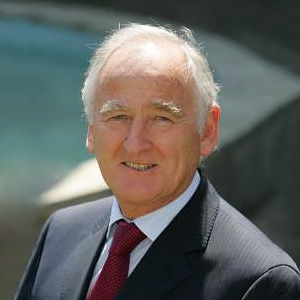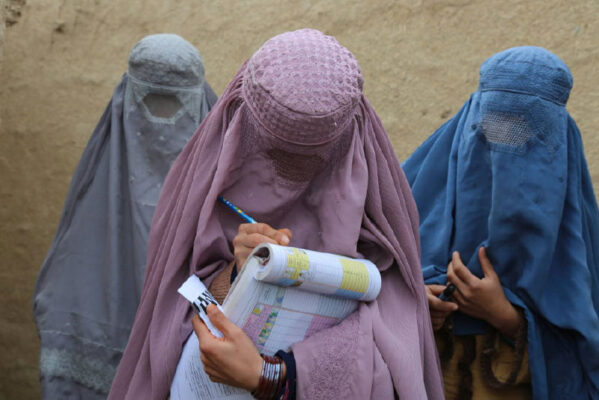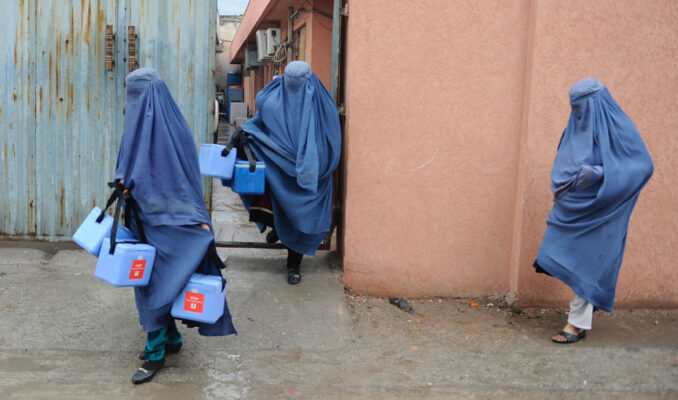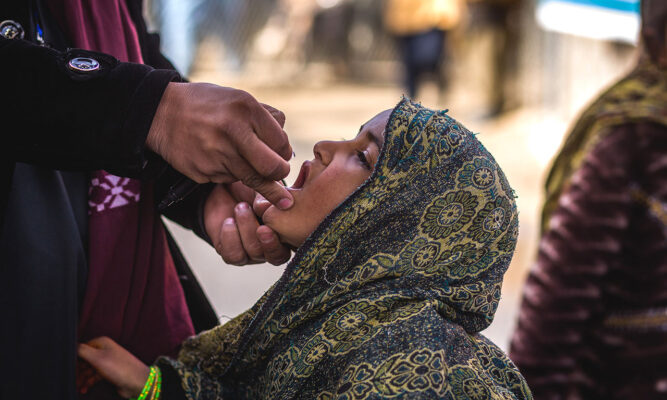The global campaign to end polio has dramatically reduced the number of cases of a dreaded disease. In 1988, there were 350,000 cases of wild polio virus (WPV) recorded in 125 countries. Last year, there were 139 confirmed cases, all of which were reported in Pakistan and Afghanistan.
This year, up to the end of August, there had been just two cases ‒ one in each of the two neighbouring countries where the virus has proven stubbornly difficult to contain.
With a Taliban-led government now in power in Afghanistan, we asked David Salisbury, Chair of the Global Commission for the Certification of Polio Eradication, what political change means for international efforts to end polio.

How would you expect recent events in Afghanistan to affect polio eradication?
Previously, although the Taliban had expressed support for polio eradication, they were not allowing house-to-house vaccination, insisting instead on a mosque-to-mosque approach.
If the Taliban can say they strongly support eradication and want to achieve this for Afghanistan, they could control the disease in their country and, ultimately, bring us closer to eradication. Let’s give them that chance.
Based on the Taliban’s previous years in control of Afghanistan (1996-2001), and the situation in areas where the Taliban has had a strong influence for some time, will international agencies expect cooperation or hostility?
In 2020, there was a degree of optimism that it would be possible to work more closely with the Taliban in areas they control. Now that they control the whole country, difficulties may arise because international agencies that had some involvement in immunisation have, by and large, left the country.

Given the active role of women in vaccination programmes in the region, how might the new regime’s policies disrupt vaccination?
Women have been hugely impactful in house-to-house and other immunisation services. Women have been trained and want to take on these roles. We don’t know yet how their role is going to emerge in Afghanistan so we have to be cautious about saying whether we can build on the gains recorded in recent years. We must wait and see.
Are you concerned that wild polio viruses could spread in the absence of vaccination?
The great worry is that if Afghanistan loses its grip on immunisation and disease surveillance, the viruses may reach other parts of the country. There is also movement of people between Afghanistan and Pakistan, and we don’t want to see viruses spreading across borders.

Prior to the recent political changes, how had polio campaigns been going in Afghanistan?
2020 was a bad year in Afghanistan and Pakistan. Afghanistan confirmed 56 cases of wild poliovirus type 1. So far in 2021, there has been only one confirmed case. After a year with relatively high numbers of cases, we often see a lower number. Nevertheless, in 2021 we were in a really good position.
Why is disease surveillance so important?
It’s critically important that we can be confident that when no cases are reported, it means cases are not occurring. That’s why maintaining surveillance is so important. Not only must we vaccinate better than before but we’ll have to have surveillance that’s better than before. Afghanistan has been able to report vaccine-derived cases which tells you that surveillance has been functioning.

Polio transmission has been interrupted in countries with a diverse range of governance and political regimes. Overall, do you see the situation in Afghanistan as significantly worse than other challenging environments in which polio vaccination targets have been met?
There are only two countries left with wild poliovirus type 1 (WPV1). Type 2 and type 3 have been certified eradicated everywhere. Whatever your view of individual regimes, you have to stand back and say every country but two have interrupted transmission. If they interrupted transmission and were certified by their respective Regional Commission, we, the Global Commission, could certify global eradication of all three types.
We know eradication of WPV1 is achievable. The circumstances may be difficult, but that doesn’t mean it’s not possible.
The international community would be heartened if the Taliban committed to interrupting transmission of polio and it may spur a positive response in Pakistan. It’s a question of whether the Taliban is ready to say ‘We want to do this for Afghanistan.’ Let’s see.
David Salisbury is Chair of the Global Commission for the Certification of Polio Eradication, and a member of the Vaccines Today Editorial Board




